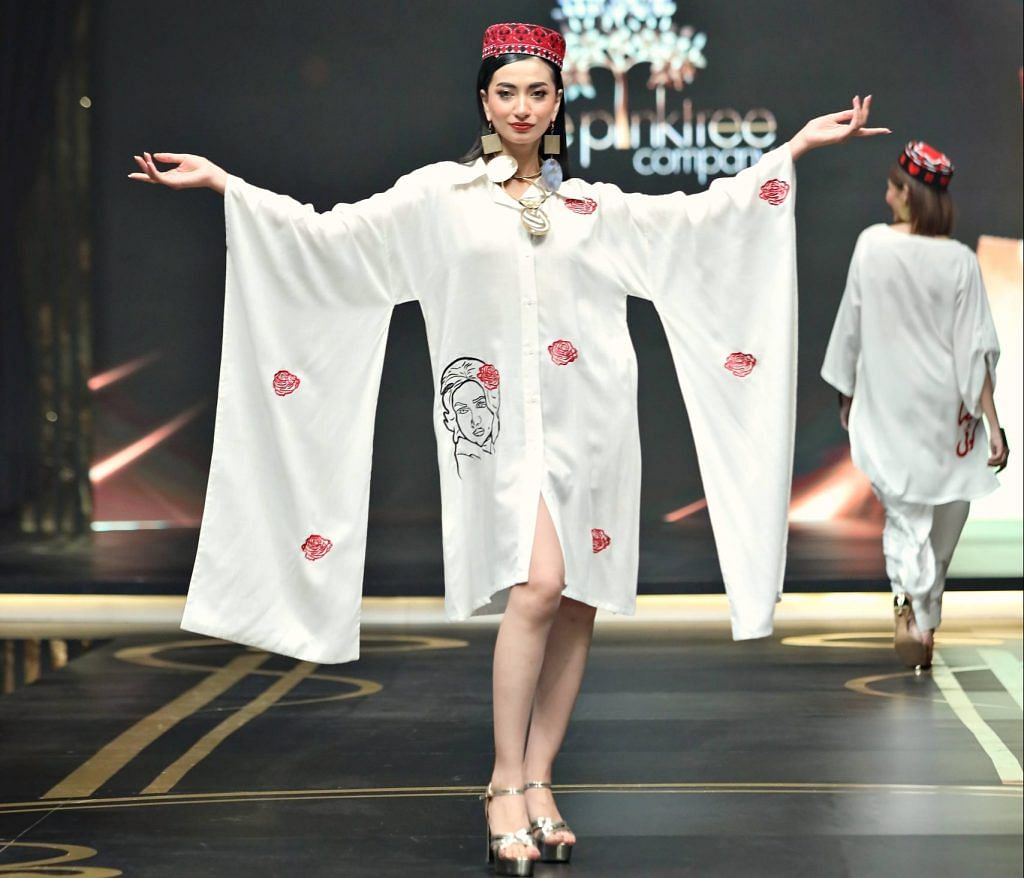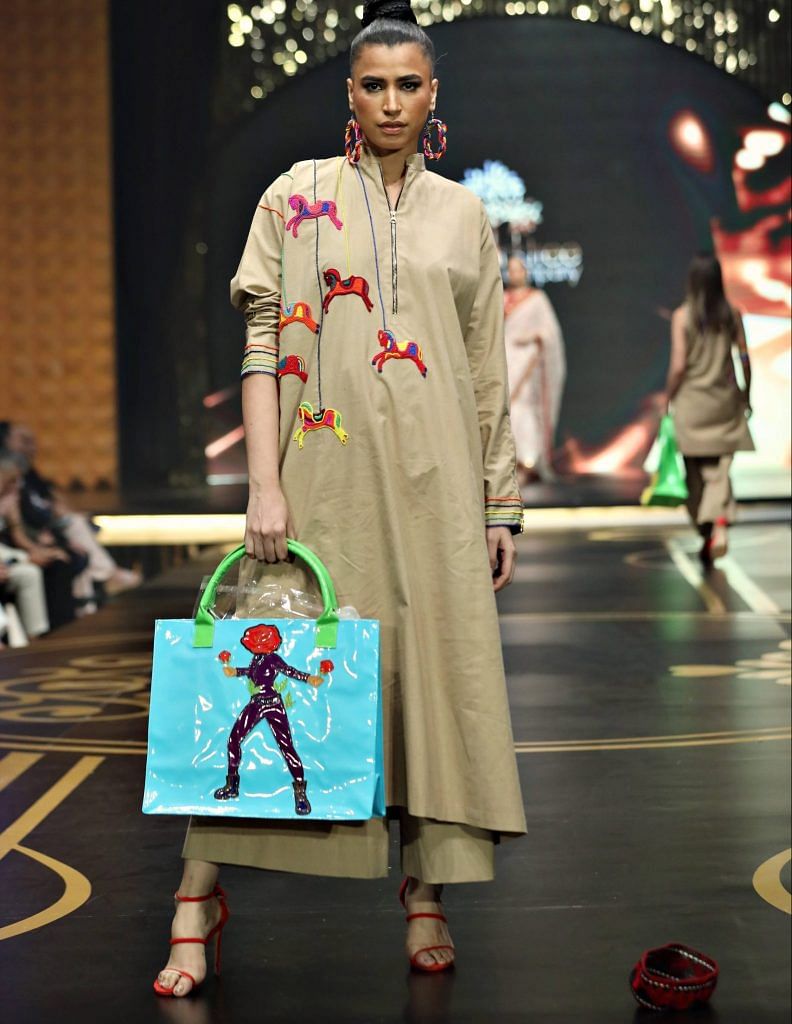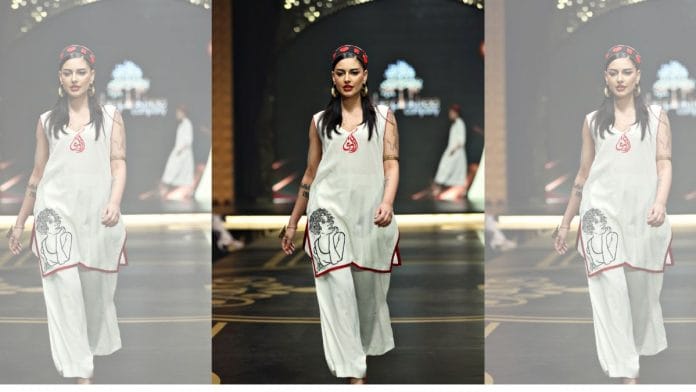New Delhi: Pakistani fashion designer Mohsin Sayeed walked the ramp at Karachi Fashion Week with Arundhati Roy and Fatima Bhutto to spread the message of resistance. Roy and Bhutto were not physically present, but their faces and words are emblazoned on Sayeed’s new collection, ‘Peace De Resistance’.
“In this fastest changing world, if something is constant, it’s oppression. However, oppressors seem to be oblivious to Newton’s third law. Therefore, the more oppression, the more resistance,” said Sayeed, founder of popular Pakistani clothing brand The Pink Tree Company. His new collection, which debuted on 5 November, takes inspiration from artists, authors and activists.
His muse is the strongest voice of resistance against oppression. Artists like Faiz Ahmad Faiz, Sabeen Mahmud, Madam Noor Jehan, and Nazia Hassan were part of the collection as well. He’s embroidered their faces and words in intricate lines in red—the colour of revolution.
This capsule was designed to showcase fashion and send a resounding message–that style can be a tool for social change. But it might come with a steep price tag. “When we make clothes, affordability is the least of our concerns. Craft is luxury and it is invaluable,” Sayeed told ThePrint. One collection from the Pink Tree, for instance, ranges between (Pakistani) Rs 25 to 30,000. But prices vary from collection to collection.

“Fashion should reflect its times. Just as Coco Chanel’s trousers were a reflection of societal change, we too are using fashion to highlight the struggles of those who resist oppression and injustice,” said Sayeed.
More than just fashion
According to Mohsin Sayeed, Pink Tree’s creations as not mere garments, but carriers of a deeper political and cultural narrative. This message has been woven into each piece, from the silhouettes to the fabric, blending beauty with activism and activists from both India and Pakistan.
The collection pays homage to figures whose personal and artistic defiance became symbols of revolution. Faiz Ahmad Faiz, whose poetry became a rallying cry for the oppressed, has been remembered through his timeless lines such as ‘hum dekhenge’ and ‘aaj bazaar mein pa ba jolan’.
Sayeed admires Arundhati Roy for her impassioned advocacy for marginalised communities.

“From Kashmir to the Rohingyas, corporatisation or Atomic weapons, Roy’s words are quoted as the gospel truth.”
Sayeed’s collection also includes tributes to other icons of resistance, such as Sabeen Mahmud, founder of The Second Floor, a cultural hub in Karachi that platforms dissenting voices and creative expression. Mahmud’s unwavering support for the Baloch Missing Persons organisation ultimately cost her her life, but her courageous spirit hasn’t been forgotten. Sayeed quotes her words as his inspiration: “Fear is just a line in your head.”
Also read: Maryam Nawaz wants Pakistan & India to tackle smog together. Policymakers are skeptical
Fashion as political commentary
The Pink Tree Company has long been known for its commitment to sustainable and socially conscious fashion. Founded in 2012, the brand specialises in blending traditional Pakistani craftsmanship with contemporary designs, all while prioritising ethical practices.
From hand-woven cotton sourced from villages in Sindh and South Punjab to eco-friendly fabrics such as kora cotton, the brand prioritises locally sourced, organic materials.
“I grew up watching my mother recycle and repurpose her sarees. For me, sustainability is ingrained in my lifestyle,” he said.
In 2018, Pink Tree Company made headlines when it unveiled a groundbreaking collection celebrating secularism. Their ‘Colour Me Secular’ line featured accessories inspired by the six major religions of Pakistan and South Asia—Islam, Sikhism, Christianity, Hinduism, Zoroastrianism, and Buddhism.
Mohsin Sayeed, who has international clients including some Non-Resident Indians, would like to see more cultural exchange between India and Pakistan.
Despite the growing interest in slow fashion, The Pink Tree Company faces the challenge of educating consumers about the value of artisanal craftsmanship. Only the rich can afford to shell out thousands of rupees for a white shirt embroidered with iconic, inspiring faces.






